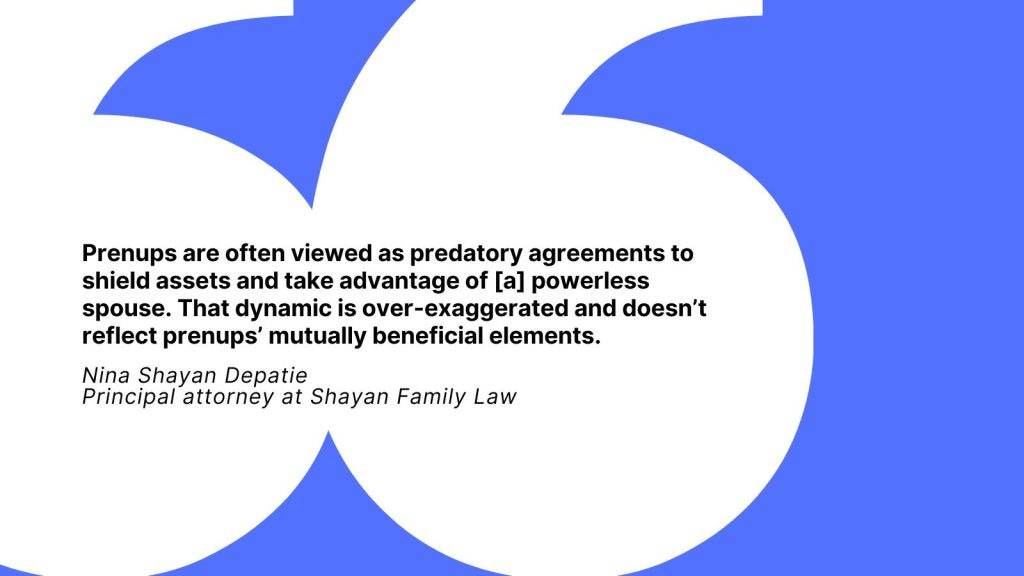High-net-worth women are redefining prenups as strategic financial plans, attorneys say
Prenups used to invoke mistrust and a lack of faith. But today, high-earning women are using them to protect their wealth and bolster marital finances.
“I’m not planning for separation — I’m creating financial certainty for our future.” This perspective reflects how successful women are redefining prenuptial agreements today. With 69% of married women now managing their household finances, prenups have evolved beyond divorce insurance into sophisticated wealth management tools.
To better understand this shift, I spoke with legal and financial experts specializing in prenups for wealthy individuals. Below, their insights reveal how female entrepreneurs are using these agreements to protect their businesses, set expectations, and build better relationships.
Why prenups are now wealth-building tools for professional women
“If [people with] significant wealth [enter] a prenuptial agreement at the time of marriage, then it should be part of [their] estate planning tools,” says Lauren Crane, a family law attorney and partner at female-owned boutique law firm Bender & Crane. She recommends working with a family law attorney and an estate planning attorney to create a prenup that complements your wills, trusts, and long-term financial strategy.
For female entrepreneurs, prenups provide crucial business protection. “Consider, for example, a woman who [started] a company after she was married and created substantial equity,” says Nina Shayan Depatie, principal attorney at Shayan Family Law. “Without a prenup, this woman’s equity could be considered community property and divided in a divorce.” Having one allows her to keep control of her company while building a fruitful life with her partner.
Prenups also strengthen communication between partners. Kaylin Dillon, a certified financial planner and prenup specialist, finds that many of her clients seek prenups to get clarity about their finances before saying “I do.” Open prenup discussions help couples build healthy financial teamwork early on.
How to propose a prenup without killing the romance
Bringing up a prenup doesn’t have to cause tension in your relationship. Experts say the right approach can actually strengthen your bond. “It’s almost cliché to say, but communication is key,” says Depatie. When done thoughtfully, the prenup talk becomes an opportunity to align on financial goals.
Here are four steps to propose a prenup while keeping the romance alive:
Step #1: Discuss basic money matters first
Walk before you run. “Have productive conversations about money before bringing up a prenup,” advises Dillon. Early discussions about spending, saving, and financial values create a natural pathway to more complex planning.
Get to know where your partner stands on these fundamentals:
What are your short and long-term financial goals?
How do you prefer to handle joint versus separate expenses?
What’s your approach to saving for major purchases or emergencies?
How comfortable are you with debt and taking financial risks?
What financial habits did you learn from your family growing up?
What does financial security look like and mean to you?
Step #2: Frame the prenup as a shared financial journey
When you feel ready, pick a private, relaxed, and positive moment to introduce a prenup. “Start [by explaining] why it matters to you,” encourages Dillon.
She suggests using language like:
“I like the idea of using a prenup as a tool for helping us clarify how we’ll handle our finances during our marriage. I’d love to start our new life together right, feeling confident we’re on the same page.”
When you frame it as a pathway toward mutual understanding rather than protection against worst-case scenarios, your conversation becomes about building something together.
Equally important is creating space for your partner’s perspective. Ask open-ended questions like, “What thoughts do you have about this?” and listen to their concerns or ideas. A little back-and-forth often leads to creative solutions neither of you might’ve considered alone.
Step #3: Focus on the mutual benefits
Crane suggests exploring the prenup as something that protects both partners.
Besides splitting assets in case of divorce, prenups help couples in these ways:
Create openness about money: When couples share all financial details upfront, they avoid nasty surprises later.
Protect from debt: A prenup can shield you from your partner’s old debts and set rules for new ones. This is imperative, as couples are about three times more likely to split up if they often argue about money.
Preserve businesses: Prenups can ensure your company runs smoothly, no matter what happens in your marriage.
Protect family assets: A good prenup can keep inherited wealth in your family while still letting you build assets together.
Save on legal costs: If you split up, having terms already set saves thousands in legal fees and avoids lengthy court battles.
Step #4: Keep an open dialogue and be willing to compromise
Couples don’t always agree on all prenup terms. But “the [biggest] ‘green flag’ is when [they] can discuss an issue between themselves and without the attorneys,” notes Crane. Navigating these conversations and reasonably compromising lays the groundwork for solving future problems together.
Here are common prenup compromises that couples may reach:
Sunset clauses: The prenup expires after a certain number of years of marriage (e.g., “After 10 years, we’ll share everything equally”).
Sliding scale provisions: Asset division changes based on marriage length (e.g., “Your share increases by 5% each year we’re married”).
Carve-outs for specific assets: You keep certain meaningful possessions separate while sharing others (e.g., “Your family cabin stays yours, my business stays mine”).
Future asset arrangements: Both create rules for things you don’t yet have (e.g., “If we buy a vacation home, we’ll own it 50/50 regardless of who pays more”).
Must-have prenup provisions for high-earning women
“No two prenuptial agreements are the same, just like no two marriages are the same,” says Crane.
However, experts point to several key provisions that wealthy women should consider:
Business valuation and buy-out clauses
Do you and your partner jointly own a business? Depatie recommends establishing procedures for valuing the company and steps for a buy-out.
A business clause may include the following items:
Agreed valuation method: Specify how you’ll determine the company’s worth.
Payment terms: Detail how payments would be structured (e.g., lump sum, installments).
Purchase options: Create first rights to buy if one partner wants to sell their share.
For example, a female tech founder might include a simple protection in her prenup. She could secure the right to buy out her spouse’s interest in the company at a fair price they agree on beforehand. This prevents having to sell the business during an already stressful time.
Clear business terms help keep your company stable during personal changes. They also prevent arguments that could harm both your business and the divorce process.
Intellectual property rights
Digital assets represent significant value for many women today. “As the creator industry continues to grow, high-earning women such as authors, musicians, actors, and influencers can use prenups to safeguard their interests,” says Depatie.
Effective intellectual property (IP) clauses often address the following items:
Future creations: Specify whether works created during marriage remain separate property.
Royalty streams: Clarify how you’ll handle ongoing income from creative works.
Social media accounts: Determine ownership of valuable online presences and followings.
For instance, an author might include a stipulation like this in her prenup:
“The creative work I produced before marriage is solely mine. We’ll share royalties earned during marriage. But I keep control of future publishing rights.”
Well-defined IP provisions prevent disputes over hard-to-value intangible assets central to your career and identity.
Family home provisions
For couples who may have children, Dillon advises having an option for the wife to keep the family home if she earns more at the time of divorce. “This way, [she] doesn’t have to move the kids during a transition that puts more strain on women’s earnings and careers than it does for men,” she says.
When crafting a family home provision, consider the following items:
Length of residence rights: Specify how long the occupant can remain in the home (e.g., until children graduate, indefinitely).
Financial arrangements: Detail how you’d split the mortgage payments or how the occupant will compensate the ex-spouse for their equity share.
Tax considerations: Address who claims mortgage interest and property tax deductions.
Income designations
Dillon suggests adding an option to designate income during the marriage as separate property. This lets you set aside earnings that won’t be part of the marital estate.
Provision at work: One of Dillon’s clients, a doctor finishing her fellowship, put this to good use. Her fiancé had sold a business for millions and wanted to focus on a second venture with plans to retire early. She supported his goals but worried about cutting her career short, knowing her highest-earning years were ahead.
Their prenup included a provision allowing her to keep building separate property from income earned during marriage. “Anything deposited in an individually titled account during marriage [would be] her separate property, not at risk of being split if they divorced,” Dillon explains. This gave the doctor financial security while supporting her partner’s plans.
The bottom line
“Not long ago, a prenup [was] a provocative idea [invoking] mistrust and lack of faith,” says Crane. “But [now, more] people are seeing it [as] an opportunity to build trust and [set] financial ground rules for the relationship.”
If you’re considering a prenup, talk to a family law attorney and a financial advisor familiar with high-net-worth planning. And if you aren’t already, have honest conversations with your partner about your money goals and concerns.
Remember, protecting what you’ve built doesn't mean you’re planning for adversity. Instead, you're building a strong foundation for a happy marriage based on clarity, transparency, and mutual respect.
Disclaimer: Laws governing prenuptial agreements differ by jurisdiction. This story provides general information — not legal advice. Please consult a local attorney for guidance tailored to your circumstances.
Enjoying Wavecomber and want to support my work? You’d make my day with a Pink Drink.
Note: This story was originally published on https://wavecomber.com/high-net-worth-women-redefine-prenups-as-strategic-financial-plans/.
Sources:
1. Certified Financial Planner (CFP) Board, “Building wealth: Insights on women’s aspirations & growing financial power.” Accessed 15 Apr 2025.
2. National Library of Medicine, “Gender differences in the consequences of divorce: A study of multiple outcomes.” Accessed 15 Apr 2025.
3. National Library of Medicine, “When couples fight about money, what do they fight about?” Accessed 15 Apr 2025.
4. Pew Research Center, “In a growing share of U.S. marriages, husbands and wives earn about the same.” Accessed 15 Apr 2025.










